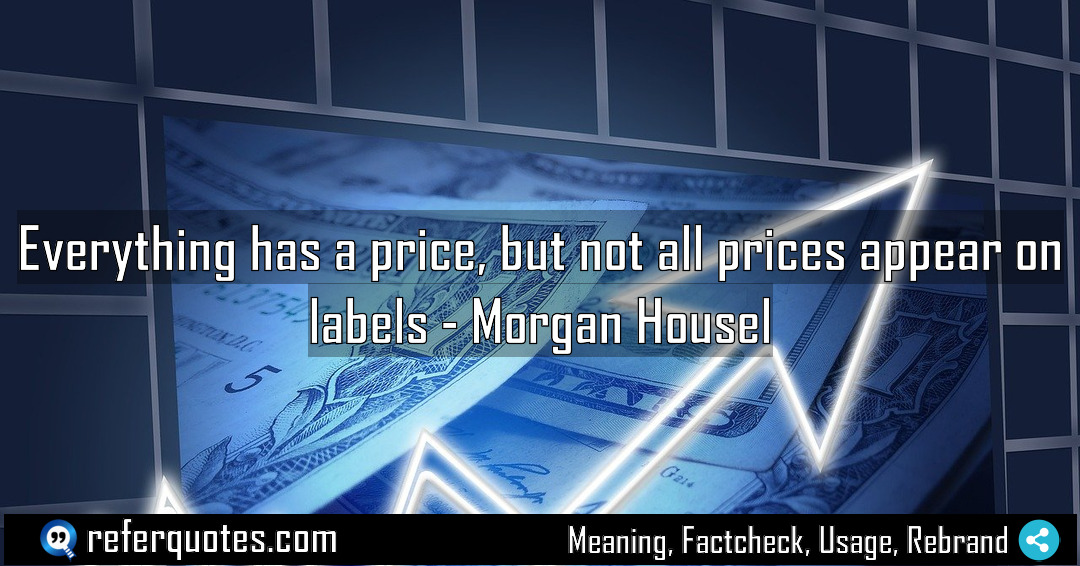
Everything has a price, but not all prices appear on labels. That’s the core of Morgan Housel’s wisdom, reminding us that the real cost of anything often involves hidden sacrifices we never see coming.
Share Image Quote:
Table of Contents
Meaning
This quote means that every single thing we pursue, own, or achieve carries a cost—but the most significant costs are rarely monetary. They’re the unseen trade-offs, the hidden sacrifices, the opportunities we let go.
Explanation
Let me break this down for you. We’re trained to see the price tag, the sticker price. But that’s just the surface. The real price of that luxury car isn’t just the loan payment; it’s the stress of the debt, the hours of your life you traded to earn that money, the investment you didn’t make because your capital was tied up in a depreciating asset.
It applies to careers, too. That high-paying, high-stress job? The price is your peace of mind, your time with family, your health. It’s an invoice that gets delivered in small installments over years, not all at once at the point of sale.
Once you start seeing the world through this lens, you realize that nothing is free. Even inaction has a price. It’s all about understanding the full cost of your decisions, not just the obvious one.
Quote Summary
Reading Level55
Aesthetic Score65
Origin & Factcheck
This insight comes directly from Morgan Housel’s fantastic book, The Psychology of Money, which was published in 2020. It’s a modern classic for a reason. You might sometimes see similar sentiments floating around, but this specific, elegant phrasing is unequivocally Housel’s.
Attribution Summary
Where is this quotation located?
| Quotation | Everything has a price, but not all prices appear on labels |
| Book Details | Publication Year: 2020; ISBN-10: 0857197681; ISBN-13: 978-0857197689; Pages: 256 (approx.) |
| Where is it? | Unknown chapter / page |
Context
In the book, Housel uses this concept to explain why people make seemingly irrational financial decisions. It’s not that they’re bad at math; it’s that they’re paying a different, non-financial price that an outsider can’t see—like the psychological comfort of a low-risk savings account versus a high-risk stock. He frames it as a core principle of behaving well with money.
Usage Examples
This is one of those ideas you’ll find yourself applying everywhere. Here’s how I use it:
- For a client chasing rapid growth: “You want to 10x the business? Great. But let’s talk about the price. That likely means 80-hour work weeks for the next two years. Your health and relationships will pay that price. Are you willing to cover that cost?”
- For a friend considering a “cheap” option: “Sure, that software is free, but the price is your data, your privacy, and constant upselling. Sometimes, paying with cash is cheaper than paying with your attention.”
- For a team deciding on a new process: “This new workflow will save us time, I agree. But the price is the mental energy to learn it and the frustration during the transition. We need to budget for that hidden cost.”
It’s perfect for entrepreneurs, leaders, and anyone making life-altering decisions.
To whom it appeals?
Share This Quote Image & Motivate
Motivation Score55
Popularity Score65
Shareability Score65
Common Questions
Question: Is this quote just about money?
Answer: Not at all. That’s the beauty of it. It’s a framework for life. Money is just the most visible, tangible example. The concept applies to time, health, relationships, and personal values.
Question: How can I identify the hidden price of something?
Answer: Ask yourself: “What do I have to give up?” and “What will this cost me in 1 year, 5 years, in terms of time, stress, or missed opportunities?” It forces you to look beyond the immediate.
Question: Does this mean we shouldn’t pursue expensive things?
Answer: Absolutely not. It just means you should go in with your eyes wide open. If you understand the full price—both the label and the hidden one—and you’re still willing to pay it, then it can be a fantastic decision. The problem is when people are surprised by the bill.
Similar Quotes
You know, “The stock market is filled with individuals” who trade on emotion, not logic. It’s a classic Graham insight that separates the speculators from the true investors. This is…
We live in a world obsessed with numbers, but they can’t measure what truly matters. Your value isn’t in your bank balance or social media likes. It’s in your character,…
You know, I’ve always found that “Politeness costs nothing but buys everything” is one of those rare truths in business and life. It’s a simple principle, but the ROI is…
You can have anything you want if you’re willing… but that’s the catch, isn’t it? It’s not about magic, it’s about the trade. The real work happens when you decide…
You miss every sale you don’t ask for… it’s a simple truth that separates top performers from the rest. It’s about turning possibility into reality through a single, decisive action.…
